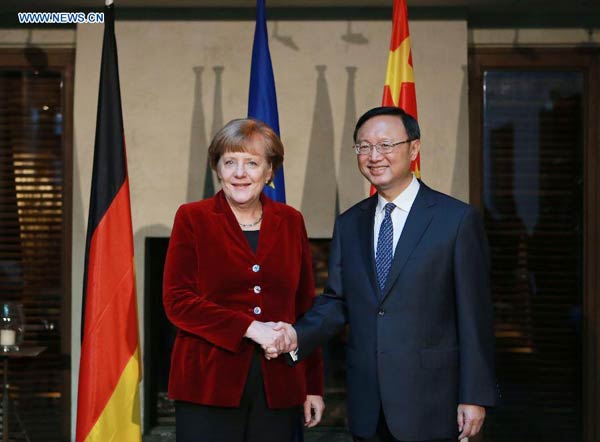Work together for cooperative world order
Updated: 2015-06-11 08:21
By Michael Clauss(China Daily)
|
||||||||
 |
|
Chinese State Councilor Yang Jiechi (R) meets with German Chancellor Angela Merkel in Munich, Germany, on Feb 7, 2015. [Photo/Xinhua] |
The fall of the Berlin Wall and the end of the Cold War in 1990 ushered in a huge new wave of globalization. Looking back after 25 years, we can now see that this development produced a number of clear winners. China is definitely among them: It started off with a GDP the size of Belgium. Now its economy is three times the size of Germany's. Germany also gained enormously. It gained freedom, peace and security and it seized new economic opportunities, not least in China. Our trade with China is twice the size of China's trade with Russia and several times the size of China's trade with any other European country.
When the world looks at China and Germany, there are parallels that are striking. The world sees two behemoths of manufacturing, of huge exports, two countries with a hard-working population, a strong emphasis on educational merit, and two cultures that value saving for the future and long-term planning over a "buy now, pay later" mentality.
There is no doubt that the global order is changing dramatically and that particularly China plays a crucial part in this process. Both Germany and China have enormous gains to defend in this changing world order. In the coming years, we should seize opportunities to create a new quality in our relations.
One of the main challenges is to make sure that all responsible nations are embedded in one world order and do not drift away into their separate universes. With this in mind, Germany supports fixing institutions lagging behind political and economic realities (IMF, UN Security Council) and takes an open and constructive approach towards new institutions and initiatives. Our decision to join the AIIB as the most important non-Asian member was driven by this motivation. Other initiatives worth exploring for deeper cooperation are, the SCO, the BRICS Bank or the Belt and Road Initiative. Germany is willing to work with China to advance an inclusive architecture that spans Europe and Asia. It will be important to build this architecture with Russia, not around or without it. The Organization for Security and Cooperation in Europe should also play an important part. It is the only relevant organization that includes North America, Europe and Asia.
Stronger services sectors and stronger internal consumption will be important to create a better balance in our economies. However, both Germany and China must maintain a leading edge in manufacturing to maintain prosperity, not least to generate sufficient resources for social justice. Germany has been working on the next industrial revolution, named "Industry 4.0", "marrying" manufacturing to the digital world. It will bring systemic change to our economy and society. "Industry 4.0" is also a key component in China's "Made in China 2025" plan. No other countries than Germany and China are better matched economically, technologically, mentally and even politically to cooperate in this field.
However, there are still important areas where China and the West do not see eye to eye. The best way to overcome distrust and misconceptions is giving as many people as possible the opportunity to go and see the reality in our countries. Growing numbers of Chinese travelling to Germany are a hopeful sign. However, there are signs of a beginning stagnation when we look at traffic from Western countries to China.
We urgently need to increase the flow of people in both directions. One important bottleneck are visa procedures on both sides. Concrete improvements in the process are important - and real: Most Europeans have shortened application procedures, also Germany. What we need even more is a different mindset - on both sides: We must recognize that Europe and China are no security threat to each other and have no issues with illegal immigration. This is a rare opportunity for enhanced exchange and cooperation in our increasingly volatile world. It should not be squandered.
The author is German Ambassador to China.
- Global health entering new era: WHO chief
- Brazil's planning minister steps aside after recordings revelation
- Vietnam, US adopt joint statement on advancing comprehensive partnership
- European border closures 'inhumane': UN refugee agency
- Japan's foreign minister calls A-bombings extremely regrettable
- Fukushima impact unprecedented for oceans: US expert

 Stars of Lijiang River: Elderly brothers with white beards
Stars of Lijiang River: Elderly brothers with white beards
 Wealthy Chinese children paying money to learn British manners
Wealthy Chinese children paying money to learn British manners
 Military-style wedding: Fighter jets, grooms in dashing uniforms
Military-style wedding: Fighter jets, grooms in dashing uniforms
 Striking photos around the world: May 16 - May 22
Striking photos around the world: May 16 - May 22
 Robots help elderly in nursing home in east China
Robots help elderly in nursing home in east China
 Hanging in the air: Chongqing holds rescue drill
Hanging in the air: Chongqing holds rescue drill
 2.1-ton tofu finishes in two hours in central China
2.1-ton tofu finishes in two hours in central China
 Six things you may not know about Grain Buds
Six things you may not know about Grain Buds
Most Viewed
Editor's Picks

|

|

|

|

|

|
Today's Top News
Liang avoids jail in shooting death
China's finance minister addresses ratings downgrade
Duke alumni visit Chinese Embassy
Marriott unlikely to top Anbang offer for Starwood: Observers
Chinese biopharma debuts on Nasdaq
What ends Jeb Bush's White House hopes
Investigation for Nicolas's campaign
Will US-ASEAN meeting be good for region?
US Weekly

|

|








